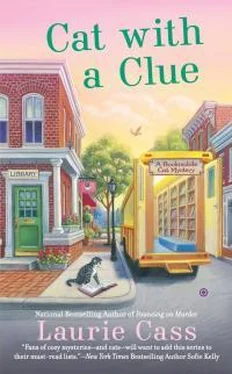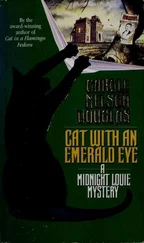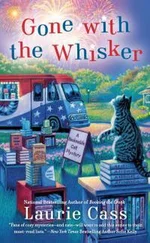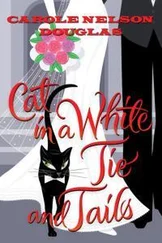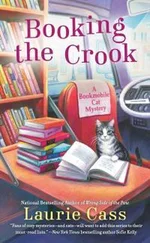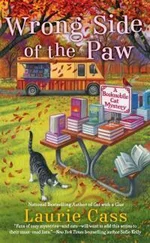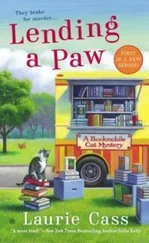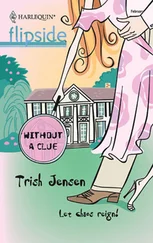“Shh,” I’d told her, helping her out of her clothes and into her nightgown. “Don’t worry about that now. Get some rest.” I pulled back the bedcovers and tucked her into bed. “Sleep now. That’s what you need more than anything.”
“Sleep?” she had asked sleepily. “I can’t possibly go to sleep right now. I have too much to do . . . too much to figure out . . . too much . . .”
And she’d been out.
I’d soft-footed it across the room and shut the door behind me. I turned to leave, then went the other way and stopped in the kitchen. After reassuring myself that she had food in the refrigerator edible for someone one-handed, I’d driven home and settled into bed with a purring Eddie, thinking that if I’d been a truly good friend, I would have offered Pam the comfort of my cat.
“What do you think?” I’d asked him, yawning. “Would you mind being someone else’s security blanket for a few days?”
“Mrr,” he’d said, lightly sinking the claws of one front foot into my arm.
“Okay, maybe it was a bad idea.”
“Mrr.”
“Okay, it was a bad idea.”
“Mrr.” He’d retracted his claws and snuggled up against my shoulder.
In seconds, he was snoring as only an Eddie could. I’d lain awake for a few minutes, thinking, then closed my eyes and, still making plans for the next day, had fallen sound asleep.
Now I turned in a small circle, surveying the damage. The stunning shock of seeing the shambles of Pam’s geniuslike retail displays had retreated, and I started to take a hard look at the damage.
After a few minutes, I had a plan, and pulled out my cell phone to start its implementation.
“Tom? It’s Minnie Hamilton. Sorry to bother you on your one day off, but— What’s that? No, I don’t need any cookies. Something happened last night, and I was wondering if you’d be willing to help.”
An hour later, a small band of downtown business owners had converged on Pam’s store. I handed out work gloves I’d borrowed from the marina office, told everyone to watch for broken glass, and put them all to work.
We piled and we sorted and we swept and we cleaned and we talked a little too loud, trying to keep the fear at bay. Chilson was a haven for so many of us, a place of calm and peace and serenity. Sure, unhappy things came around every once in a while, but to have something like this happen, something malicious and evil, well, this was different.
At one point, I held out my hand for cash donations and ordered a stack of pizzas from Fat Boys. When I came back, arms laden, I held out my hand again. “Take your money back,” I said. “Those guys heard what we were doing and wouldn’t take any money.”
But no one, from Cookie Tom to the Shomins to Shannon Hirsch, an attorney at the other end of downtown, would take their cash. “We’ll leave it for Pam,” the owner of the jewelry store said. “It’s not much, but she’s going to need it.”
Everyone nodded.
“Even if her insurance company pays out,” said the hardware store’s owner as he picked up a slice of pepperoni and sausage, “it’ll take weeks, if not months, to get a check, and she’ll need cash to replace stock.”
Which was far easier said than done, because Pam’s buying trips were done in the slower seasons, not in the busy summer. We all knew this, but since there wasn’t anything we could do about it, we ate and drank the soda and water that the Fat Boys had also donated, and got back to work.
Late in the afternoon, as Reva Shomin and the owner of the bike shop were trying to wrestle a corner cupboard back into the exact position we’d all decided it had been yesterday, a loud voice cut through the chatter.
“What on earth are you doing?”
The cupboard thump ed to the floor, rocking a little, then going still. Everyone looked at each other, then as one, they all looked at me.
I swallowed and turned to face Pam, who was standing in the front doorway with her hands on her hips. Well, technically, one hand on one hip because the other hand was poking out of a sling, but whatever.
“Um,” I said. Earlier, I’d thought about calling her and making sure she was okay with us going ahead and cleaning up. But I hadn’t wanted to wake her if she was still sleeping, and since she’d left her purse behind in my car, a purse that had contained the keys to the store, I’d figured I’d get started, then call her a little later.
“I meant to call you,” I said lamely. And I had; I’d just ended up so busy I’d forgotten all about it. I suddenly remembered my mother’s admonitions to think first and act second. Maybe next time I’d remember her advice at a moment when I could implement it.
“Hey, Pam,” Cookie Tom said, nodding. He probably would have waved, but his hands were busy because he was hauling books from one of the carefully sorted piles. “Maybe you should sit down. You look a little pale.”
He was right. I guided her to a tall stool that the owner of a local bar had hauled in for us to use. “Just sit a minute,” I said. “You can direct everything from there.”
“But . . . but I don’t even know all these people,” she said, bewilderment clear on her face.
This was because our work crew had accidentally hauled in some passing tourists who had seen the activity inside and been more than willing to roll up their sleeves and pitch in.
“They’re people who want to help,” I said, opening a water bottle and handing it to her.
“But—”
“Drink,” I told her. “I’m willing to bet you haven’t had enough fluids today, and I know they told you at the hospital to make sure you stay hydrated.”
Not really paying attention to what she was doing, Pam took a sip of water. “How did . . . Why are . . .” She shook her head and glanced around, her eyes wide. “Everything’s almost done. I thought this would take days.”
“Many hands make light work,” I said, nodding as wisely as I could.
Pam blinked. “I can’t believe . . .”
Before she could go all teary, I nudged her hand, encouraging her to drink. When she was doing so, I started listing our accomplishments. “We decided to sort things into groups. Things broken beyond repair, things that were damaged but still saleable, and the things that weren’t damaged at all.” Her expression turned pensive, and I hurried on. “The busted-up pile was the smallest by far, and we took lots of pictures for your insurance claim.”
“Got them right here,” said Kirk, owner of the local photography studio, tapping his laptop. “I’m finishing up the file names.”
“Same with the slightly damaged stuff,” I said. “Kirk will burn DVDs so you and your insurance company will have records.”
“You . . . will?”
“Not a problem,” Kirk said, smiling at her. “Glad to help.”
“Really?” she asked.
I rolled my eyes. “And over there, at the other laptop, Trudy is finishing up an inventory.” Trudy, an accountant, waved a manicured hand in our direction but didn’t look away from the computer. She’d been happy to help out, and even happier to know that her specific help wouldn’t involve the lifting of anything heavier than her computer’s mouse.
“When it’s done,” I told Pam, “Trudy will e-mail you the spreadsheet. We didn’t know how you track your stock, so Trudy put the data into lots of columns. You can sort it any way you need and compare it against your existing list.” I didn’t have any firsthand knowledge of Pam’s inventorying practices, but I knew without a doubt that this capable woman kept accurate track of the items in her store.
“I . . . don’t know what to say.” Pam clutched the water bottle hard enough to make the thin plastic crackle. “I . . .”
Читать дальше
